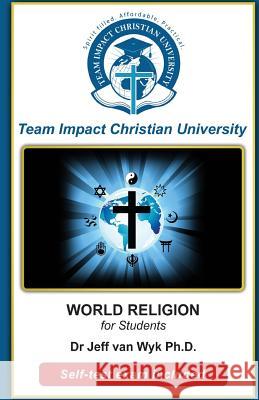World Religions for Students » książka
World Religions for Students
ISBN-13: 9781517101930 / Angielski / Miękka / 2016 / 236 str.
Why Study Religion Studies in religion are concerned with the diversity of religious experience and expression across all civilizations, ancient and modern, and all racial and ethnic backgrounds. The serious study of any religion requires a careful reading of its primary texts, preferably in the original language. This, however, is an ideal that few can approach. Almost without exception, the sacred scriptures of the world are cryptic and difficult for the novice to make much sense of. Moreover, everyone will find one or the other of the religions to be of greater interest, but will not know initially where to begin. What is needed, then, is an accessible overview. General studies aim to meet this need, conveying the basic tenets-or beliefs-of each religion at a high level. Christianity in the twenty-first century cannot avoid confronting the questions posed by the diversity of religions. Since the Christian life cannot be lived in a socio-cultural nor religious vacuum, it is no longer sufficient for believers to know only what their Bible says or how to live Christian lives. They must develop the capacity to critically evaluate alternative religious traditions and worldviews, and to cultivate the skills necessary to participate fully and responsibly as Christians in religiously plural societies. Religion has always been with us. Throughout history, it has expressed the deepest questions human beings can ask, and it has taken a central place in the lives of virtually all civilizations and cultures. As we think all the way back to the dawn of human consciousness, we find religion everywhere we turn. This may be true of the past, but what about the present - and the future? In recent times, critics have suggested that religion is on the way out. Technology and science have changed our view of the world radically, leading some to say that we have entered a new stage of human existence, without religion. Soon, they argue, it will truly be a thing of the past. In our day and age, rumors of religion's demise seem very premature - and perhaps there's no grain of truth in them at all. Religion persists and is often on the rise, even as scientific and non-religious perspectives have become prominent. We still find religion everywhere, on television, in film, in popular music, in our towns and neighborhoods. We discover religion at the center of global issues and cultural conflict. We see religion in the lives of the people we know and love, and in ourselves, as we live out and wrestle with our own religious faith. Religion is powerful and persistent, and it shows no signs of disappearing. It provokes heartfelt commitment, eloquent expression, forthright action, and intense debate. For both practitioners and observers - for everyone who wants to be informed about the world around them - religion is an intensely curious phenomenon that calls out for better understanding. It is an incontrovertible fact that from the beginning of time, humans have engaged in activities that we now call religion, such as worship, prayer, and rituals marking important life passages. Moreover, religions have always asked fundamental questions, such as: What is the true meaning of life? What happens to us after death? How do we explain human suffering and injustices? The answers different religious traditions give to these important questions are many and varied and often contradictory. However, the questions themselves are ones with which humans throughout time have grappled, and probably will continue to grapple with into the indefinite future. Thus, one of the first reasons to study religion is simply to deepen our understanding of others and ourselves.
Zawartość książki może nie spełniać oczekiwań – reklamacje nie obejmują treści, która mogła nie być redakcyjnie ani merytorycznie opracowana.











